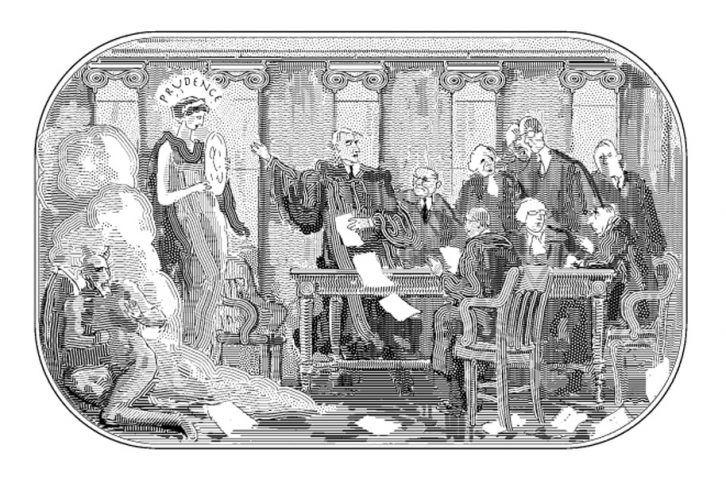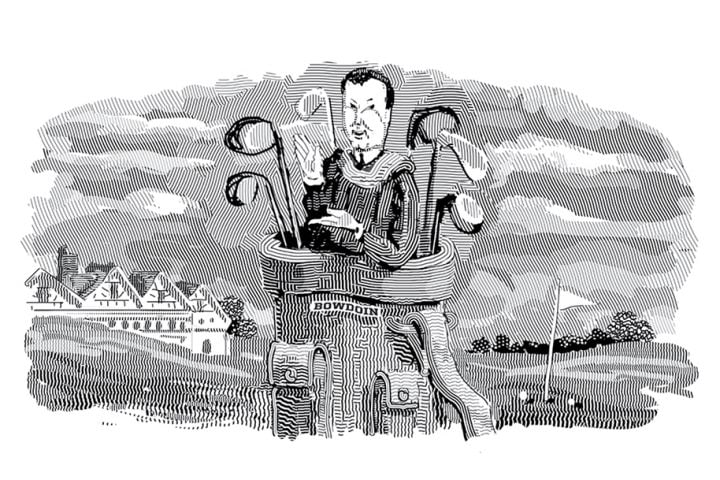Books Reviewed
A review of The Uses of Pessimism: And the Danger of False Hope , by Roger Scruton
, by Roger Scruton
Roger Scruton, a philosophy professor who some years ago gave up the academy, is a public intellectual highly regarded on both sides of the Atlantic. Best known for his conservative politics, he writes with rare grace and penetration on music, architecture, aesthetics, and everything associated with high culture. A sophisticated and moderate political thinker, he offers a conservatism that synthesizes tradition and liberty, Edmund Burke and Adam Smith.
Indeed, Scruton is one of the last representatives of an English tradition in which conservatism and liberalism come together in defense of civil society and of a humanizing tradition of liberty. He is a liberal because he knows freedom is always an exercise of the "I," of the free and responsible human person. At the same time, he takes aim at a reckless "‘I' attitude" that forgets that freedom comes into being through the "We," through a tradition of civilized liberty that has nothing to do with collectivism. We are all indebted, if we but know it, to the wisdom found in custom, faith, and law. Scruton never ceases to defend this fundamental conservative insight.
His latest book, The Uses of Pessimism: And The Dangers of False Hope, defends humane pessimism against those who turn genuine hopefulness about the human condition, a good thing, into utopian expectations and demands, a very bad one. Employing rare learning and eloquence, he makes the case for "small-scale wisdom" rather than "large-scale folly."
Scruton fully appreciates that a free society depends on something much more substantial than contractual relations. It must draw upon what Aleksandr Solzhenitsyn in his 1978 Harvard address called those rich "reserves of mercy and sacrifice," an inheritance of the pre-modern Western philosophical and religious traditions. It is these reserves that allow a "community of strangers" to be a genuine community and not just a collection of disconnected individuals. As Scruton noted in The West and The Rest (2002), America's constitutional arrangements themselves presuppose a pre-contractual "We," a preexisting people who desired to form a "more perfect union."
* * *
The core of Scruton's new book is a critical examination of the fallacies that lie at the heart of "unscrupulous optimism." Remarkably resistant to reality, these errors also give rise to a systematic disregard for those limits and constraints "that create the frame that gives meaning to our hopes." Ultimately, they reflect an attitude destructive of love and friendship, as well as the moderation and forbearance that allow human beings to live in free, lawful, and peaceable political communities.
Those who succumb to the "best case fallacy" think like gamblers, always convinced they're going to beat the house. Incapable of a balanced assessment of risk, they confuse openness to the future with ungrounded hope, and blithely assume that best-case scenarios are written into the forward march of history. Scruton convincingly argues that the worst kinds of optimists were the 20th-century totalitarians "drunk on false hopes." Their best-case scenarios were inseparable from nihilistic projects like the Holocaust, the Gulag Archipelago, and the Great Leap Forward that set out to replace recalcitrant reality—and superfluous human beings—with material more conducive to revolutionary experimentation and manipulation.
Totalitarians of the left and right treat the human condition as a problem to be "solved" and in the process destroy "all the institutions and procedures through which mistakes can be corrected." But utopian illusions—and the best-case fallacy with which they are linked—are not the sole property of the totalitarian enemies of civilization, a point Scruton illustrates through an instructive analysis of the sources of the 2008 financial crisis. The smallest dose of pessimism would have suggested that one cannot give massive credit to those unlikely to pay their debts, because property ownership can never be more widespread than fiscal probity and personal responsibility.
He fully acknowledges the virtues of the market economy, while making a larger point about how our worldly societies are in their own ways "addicted to unrealities." We thoughtlessly transfer debts to the future and place excessive hopes in pieces of paper that too often bear empty promises. We are so present-minded that we forget the bonds connecting the dead, the living, and those not yet born. In Scruton's view, the credit crisis didn't entail a refutation of free market principles: risk-taking is an essential part of a free and humane economy. But a scrupulous optimism would have better allowed us to appreciate the limits of reckless risk-taking and the concomitant need to honor our commitments and settle our debts.
The chapter on the "born free fallacy" is one of the best in the book. Scruton owes a great deal to Hegel's essentially conservative insight that the price of human freedom is "reciprocity." In the spirit of "Right-Hegelianism," Scruton takes aim at the identification of liberty with freedom from law or restraint, an error coextensive with radical modernity. Freedom, he eloquently affirms, "is genuine only when bound by laws and institutions that make us accountable to each other, that oblige us to acknowledge the freedom of others and also to treat others with respect."
He suggests that it is through the modern educational establishment that the born-free fallacy has "found its most potent channel of influence." Progressive educators want to liberate the inner self from external restraints and discipline—that is, from the indispensable preconditions of educational achievement. Scruton convincingly argues that they have succeeded all too well in undermining British public education, which had given a working-class boy such as himself access to the best that had been thought and said. In its place, modern educators offer nothing more nourishing than multicultural pieties and an aversion to elitism in all its forms.
Scruton provides a particularly devastating treatment of, what he elsewhere calls, the worldwide "culture of repudiation" arising from the revolutionary upheavals of May 1968. The revolutionaries got the crucial question exactly and utterly wrong. They perversely saw human freedom at work in a totalitarian regime—Maoist China—which had the closest proximity to George Orwell's 1984 of any of the great totalitarian regimes of modern times. At the same time, they confused the relative decencies of Charles de Gaulle's conservative Fifth Republic with a fascist or neo-fascist regime.
The revolutionaries failed miserably in their immediate political project, overthrowing de Gaulle in order to bring the blessings of Maoism to France. But the culture of repudiation did begin its long march through Western cultural and educational institutions. At the heart of this cultural project lay the promise of liberation for a "real self" allegedly born free but repressed by authoritarian institutions. As Raymond Aron pointed out at the time, the New Left theoreticians and shock troops treated the authoritative institutions necessary for any society, including a liberal one, as attributes of authoritarianism. Whole disciplines or pseudo-disciplines in the academy today build upon this fundamental intellectual abdication. Very much part of the establishment, they resort to mind-boggling jargon and obscurity to defend themselves against commonsense truths. Scruton's sobering and altogether accurate account inspires little confidence in the future.
His discussion of the "planning fallacy" includes an incisive critique of the European Union. For Scruton, a community of citizens is necessarily rooted in territorial democracy, an essential attribute of which is the right of citizens to eject officers who abuse their powers. But since the whole immense body of E.U. regulations, coming in at more than 170,000 pages, is part of the European treaty and thus irreversible, citizens are powerless to modify the steadily advancing European project or to hold the political class implementing it to account. If Europeans vote "wrongly"—as the Danes did in rejecting the Maastricht Treaty in 1992 and the French and Dutch did when they turned down the proposed European constitution in referenda in 2005—the nations are told to keep voting until they get it right. Then the question will be settled, and no further elections permitted. As Scruton shows, the much-discussed "democratic deficit" is a built-in feature of the European project.
* * *
While roundly repudiating a comprehensive gloom that risks culminating in nihilism and despair, Scruton raises some truly disturbing questions about the persistence of utopian illusions despite all the evidence to the contrary. Obvious errors, it seems, are the most difficult to rectify. He even speculates that an irrational resistance to moderation and good sense is "hard-wired in the human cortex," describing the role of an uncompromising "‘I' attitude"—resistant to both negotiation and dissension—in maintaining the unity of hunter-gatherer societies whose very existence was threatened by scarcity and by a war to the death with other tribal entities. He posits that the residue of this attitude and situation is "at the root of the born free fallacy—the sense of an original condition untroubled by compromise, institutions or laws." These admittedly speculative "anthropological" claims have led many early reviewers of the book to place Scruton in the fashionable camp of the evolutionary psychologists who make human beings playthings of the evolutionary process.
That assessment is not entirely accurate or fair. Scruton warns against what Bertrand de Jouvenel once suggestively called "primitivist nostalgia," reminding us that the only kind of community available to human beings in historical time is one where conflicts are resolved through negotiation, compromise, and law. This is the "order of the city." In contradistinction to the evolutionary psychologists with their crude and unreflective reduction of human nature to evolutionary "hardwiring," Scruton argues that the city "has entered the soul of mankind." As political animals, human beings have evolved in ways that are radically distinct from the "groups, herds, and colonies of animals." Human beings make sacrifices for others—they freely respond to the calls of friendship and agape—and those moral and civic sacrifices require "no biological basis to be real." Unfortunately, Scruton's less than coherent resort to a quasi-biological explanation of the seemingly limitless human capacity for political self-delusion undermined his position, encouraged misunderstandings, and led many critics to identify him with a position he emphatically repudiates.
The Uses of Pessimism has a more significant problem. His conservatism self-consciously brings together Burke and Friedrich Hayek, a defense of tradition and a critique of centralized planning. In fact, he goes so far as to suggest that Burke's defense of "prejudice," the wisdom inherent in tradition, and Hayek's defense of free exchange "are to be justified in exactly the same terms." In their own way, our forebears "allocated" wisdom to us much as the pricing system allocates information to producers and consumers. For this reason, Scruton identifies himself with a British conservative tradition that has tended "to see no tension between a defense of the free market and a traditionalist vision of social order."
He acknowledges that the old moral consensus is breaking down but doesn't reckon with the resulting threat to the conservatism he champions. Are epistemic modesty and a defense of tradition, however "rational" in orientation, sufficient in such a situation? Scruton, like the larger British conservative tradition, has surprisingly little to say about the philosophical resources that might allow one to at least fortify a civilization that is in the process of losing its habitual or ancestral supports. His conservatism thus risks becoming nostalgic, an elegy for an older England and Western world not yet fully ravaged by, what Walter Lippmann called, the "acids of modernity."
These criticisms aside, one cannot but recommend this beautifully written book. It contains dozens of memorable passages and formulations and is in many respects a classic of conservative, anti-utopian political reflection. Its subject matter—the seeming imperviousness of modern intellectuals to evidence and experience—ought to be of interest to anyone who desires to come to terms with the subversion of free politics by ideology, and of hope by utopianism.




